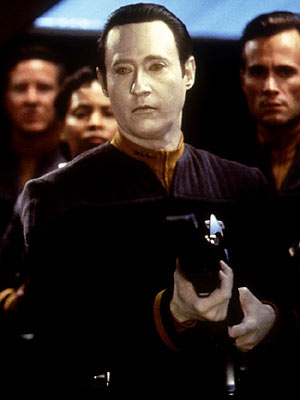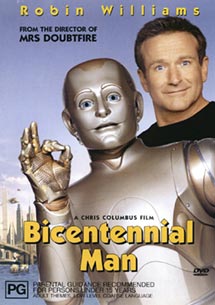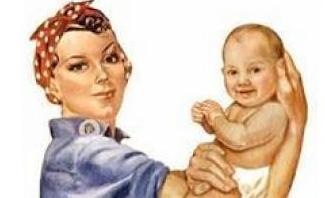Artificial intelligence has become an increasingly researched subject over the past few decades because of a growing curiosity among researchers as to whether it is possible and if so, how quickly it can be implemented. This curiosity has led to, or perhaps has stemmed from, the depiction of robots and robot-like characters in books, television shows and movies. As there are a vast number of such characters with different physical traits, purposes of creation and paths taken by them, I will primarily be focusing on androids depicted in television shows and movies, although it is by no means an exhaustive list.
To be clear, an android is a specific type of ‘robot or artificially created being that closely resembles humans’ (Wikipedia). They may have skin and blood, which are organic, but these do not affect the working of the skeleton and internal systems of the androids, which are completely mechanical. This feature distinguishes androids from cyborgs, organisms that have symbiotic natural and artificial systems (Wikipedia). Also, the examples I have picked show the growth of the ‘human’ character in them or the desire to become human, which being the product of human imagination, shows that we humans are interested in the possibility of a development of these characteristics.

From Left to Right: Vicki, Ted, Joan and Jamie Lawson in Small Wonder
One example of an android can be seen in
Small Wonder, a television series shown in the mid to late 80s. The android is a ten year old girl named V.I.C.I. (Voice Input Child Identicant) or Vicki for short. She was created by Ted Lawson, a robotics engineer, who designed her to be a domestic servant. He chose to create her in the image of ‘an adorable girl’ so that assuming that people would be drawn to her ‘cuteness’ it would increase sales (Wikipedia). However, after creating Vicki, Ted’s wife, Joan wanted to keep her and so they decided to adopt her. The rest of the series shows how Ted, Joan and their ten year old son, Jamie, try to keep Vicki’s true identity a secret and how they grow to love her as if she is a human girl. Vicki is portrayed as being different from humans, not only by the control panel in her plastic back, but by her monotone voice, wearing the same dress everyday and lack of emotion. Not understanding certain human phrases and sarcasm, she literally does everything she is told to do. Through the series, however, we see that she picks up more human qualities. A powerful example is seen in the last episode of the first season where a ‘tear’ flows from her eyes on two occasions – when Ted’s father angrily tells her that he will never accept her as his granddaughter because she isn’t human, and then at the end of the episode where he thanks her for saving his own life and tells her that he has accepted her. This display of emotion links her to becoming “a real female – she cries when she’s sad and she cries when she’s happy” (Ted Lawson, episode 24).

Lt. Commander 'Data' from Star Trek: The Next Generation
In
Star Trek: The Next Generation, a late 80s – early 90s sci-fi TV series based on the original Star Trek, Lieutenant Commander “Data” is an android who serves on board the USS Enterprise-D and E. As can be seen in the picture, he has the appearance of a man but his ‘skin’ and irises are pale white, which distinguish him from most of the crew on the ship. His ‘positronic’ brain also gives him superhuman computational power. However, like Vicki, he has “ongoing difficulties understanding various aspects of human behavior and is unable to feel emotions or understand certain human idiosyncrasies” (Wikipedia). Data perceives emotions and is fascinated by them. As per Gene Roddenberry, the creator of the series, “over the course of the series, Data was to become ‘more and more like a human until the end of the show, when he would be very close, but still not quite there” (Wikipedia).

Robin Williams as robot Andrew (left) and android Andrew Martin (right) in Bicentennial Man
The third android example I have drawn on is in
Bicentennial Man, a 1999 film that is based on the 1976 Isaac Asimov novella of the same name. This example is different from the others in two ways. First, the android, Andrew, is initially a robot and not an android. He is sold to the Martin family to perform housekeeping duties. The second difference is that unlike Vicki, Data and even the other robots in the NDR series that Andrew belongs to, Andrew displays originality, curiosity and an ability to perceive and reciprocate some emotions. Andrew’s journey to becoming human is more perceptible in that he becomes an android with a human male form. The incredible leap is when he actually becomes human enough to fall in love with his old master’s great-granddaughter, Portia. This is enabled by inserting chemicals similar to human hormones in his system. After spending years with Portia, he wants to marry her but the World Congress refuses permission on the basis of his being immortal and therefore not human. He proceeds to turn himself into a prosthetic human with a blood-like substance inserted into his system so that he can age. His reason for doing this is “[t]o be acknowledged for who and what I am; no more, no less … the simple truth of that recognition has been the elemental drive of my existence and it must be achieved if I am to live or die with dignity” (Wikipedia).
In all three examples we see task-specific androids that, in spite of looking human, do not initially act like humans. With time though, they adopt more human characteristics. As these three examples are a product of human imagination, we see that humans are curious about creating artificial intelligence that is capable of evolving into a more human character with emotions and a conscience.
This desire to create artificial life, to actually put together a creature piece by piece and have it grow and think for itself, could be indicative of the desire for power that humans have – the power to ‘be god’ and create life. Such a method of creating life is different from the more common and ‘natural’ means of human reproduction as we don’t have that much control over how a baby physically develops. It is also possible that if the artificial intelligence did become human-like, then we would not have control over it. But the intriguing idea, the driving force, is seeing whether we can actually do it.
References:




This is a very intriguing paper. I’m especially interested in the various ways that the creators make distinctions between human and robot. Except for Bicentennial Man, all the robots are played by humans, adding another layer–like boys playing girls playing boys in Shakespeare plays. It seems to me that some of the depictions show our ambivalence about robots. As you suggest, humans seem to want to play God, but by putting these creations in a subservient role and making sure that humans do control them, we try to allay our fears about the technology becoming more powerful than us. I wonder, too, if there’s some desire to find others like us, but smarter, to help us figure out the world’s problems. One thing that might be interesting to add to this paper is the gender issue. You do have one female robot/android represented. How does she differ from the men? As I said above, she creeps me out more than the other two for some reason. I wonder why I have that reaction. That might be an issue to explore further. You might also include or consider Maria from Metropolis who is made to look completely human in order to trick the workers. In the cases you mention here, there’s always a clear distinction, in part I think because humans are afraid of being tricked.